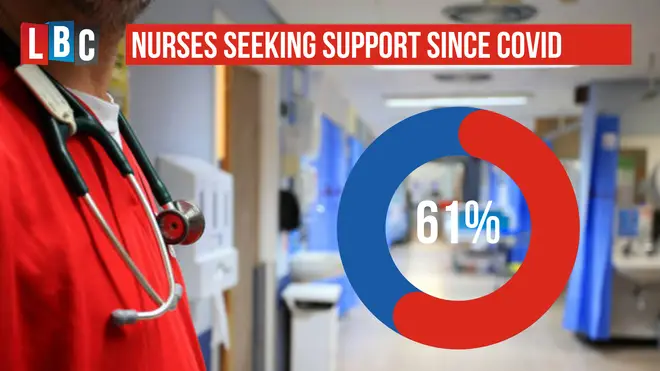
Clive Bull 1am - 4am
22 June 2021, 07:40

The world's largest nursing union has told LBC it's seen an "unprecedented" rise in the number of nurses needing mental health support since the pandemic began.
Figures seen exclusively by LBC show 60% more nurses are now being helped by the Royal College of Nursing (RCN) compared to March 2020, before the first national lockdown.
Specialists there are now seeing around 140 new nurses and delivering up to 640 counselling sessions every month.
It's the latest data on the scale of suffering being felt by NHS staff who've been battling on the frontline of the crisis for more than a year.
The union's lead for mental health nursing, Stephen Jones, told LBC: "Just to be going through the RCN, which is separate to other organisations, is quite a number.
Read more: Mental health services for children 'at breaking point' as Covid adds huge strain
Read more: Coronavirus affecting mental health 'the norm,' research shows
"It's not just the number but the nature of those calls. Some of it has been trauma such as PTSD and anxiety. Most commonly it seems to be moral distress, and people not feeling like they can fulfil their jobs thoroughly and safely."
In response to demand, the RCN set-up a dedicated trauma service in May 2021. It has so far made 45 referrals to the department – making up 21% of the total referrals made to the counselling service within the same time period.
"Anne", a district nurse, was pregnant during the first wave of coronavirus in the UK, and told LBC she gave birth eight weeks early due to stress.
She said: "We were hitting days where we didn't have enough staff to accept any new patients.
"You're dealing with people that are really scared, and it was so hard, and I was so terrified of missing something and making a mistake."
She told LBC it resulted in "a real feeling of guilt and fear", and her baby was born prematurely as a result.
![Specialists are now seeing around 130 new nurses and delivering up to 640 counselling sessions every month [file photo]](https://images.lbc.co.uk/images/245838?crop=16_9&width=660&relax=1&format=webp&signature=JoKnWSG_uUFIm-1OAQ4FJvP8w2U=)
‘Anne’ is now considering leaving the profession, saying “I have a son to think about now, I need to put him first unfortunately and it breaks my heart because that means one less nurse with experience seeing patients”.
In a survey of 13,500 NHS workers by the GMB Union, published in April 2021, almost 70% said that work was causing them stress or impacting on their mental health.
The most popular reasons for this were fears of taking Covid-19 home and for their own safety, not being able to see family and friends, balancing work and caring responsibilities and financial pressures.
Over 85% of respondents strongly or somewhat agreed that compared to 12 months ago, working during Covid-19 has had a serious negative impact on their mental health.
A similar study by the British Medical Association found almost half of doctors said that they were currently suffering from depression, anxiety, stress, burnout or other mental health conditions relating to or made worse by their work.
Matthew Tuck, member of the BMA's junior doctors committee, told LBC the true scale of the number of staff struggling is much higher than reported.
"People don't readily admit to having mental health or emotional distress in person or in surveys, so if a survey says half are struggling, I would imagine a great deal more are than are admitting to it.
"I think the numbers will be far higher, I think even close friends who I think are coping and are doing well will be secretly struggling. The numbers will show one story and there will be many people behind it that aren't picked up by this."
Stephen Jones, mental health nursing lead for the RCN, says there are fears NHS staff could quit as a result.
He told LBC: "We do know there are people leaving the profession. A lot of that has been, not just around the stress and pressure that staff have been under, but also the anticipation of "what next?".
"Specifically for mental health nursing, you have this fear of a tidal wave of mental health problems. We are starting to see more and more of what that actually looks like, and it's predominantly our younger people in society that have really struggled."

Natasha Devon's response to texter questioning mental health activism
A spokesperson for the Department for Health and Social Care said: "We recognise the enormous pressure this pandemic has put on all NHS staff and we are working closely with the NHS to rapidly accelerate the recovery of services so everyone gets the care they need.
"There are a record numbers of doctors and nurses working in England, and to support their wellbeing we're investing £37 million towards staff mental health hubs, a helpline and a 24/7 text support service.
"At the same time, we're backing the NHS with £1 billion to tackle the backlogs that have built up as well as giving hospitals £160 million so they can find innovative ways to carry out even more operations and cut waiting lists."